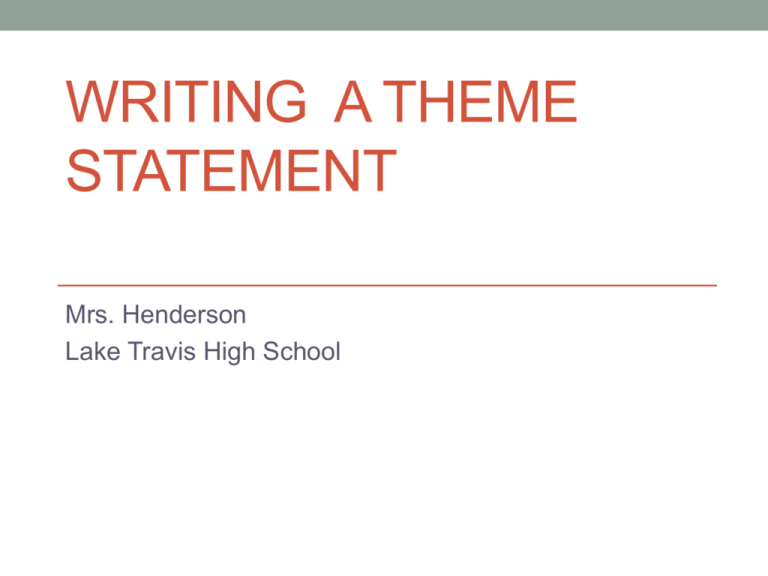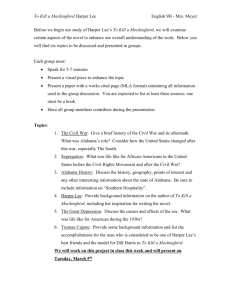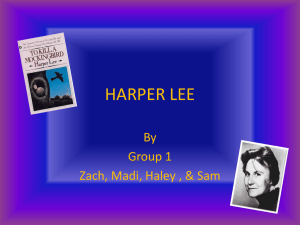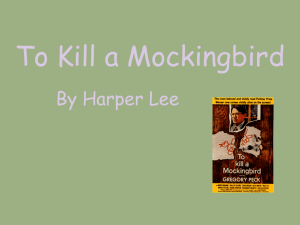Theme Statement Review
advertisement

WRITING A THEME STATEMENT Mrs. Henderson Lake Travis High School A Strong Theme Statement • Is written in a COMPLETE sentence. • Includes title and author • Is written in the form of an assertion • Does NOT state the obvious/define a big idea word with its standard definition. • Does NOT use personal pronouns “I” or “you” How Not To State the Obvious • Instead of supplying a standard definition of the word, consider the following questions: • Is the book suggesting that the big idea causes something? • Is the book suggesting that the big idea is a result of something? • Is the book making some sort of value judgment or offering some opinion on this concept? • Is the book defining this idea unconventionally? EXAMPLES OF COMMON PROBLEMS AND THEIR SOLUTIONS 1. One problem is mistaking the big idea for a theme. In other words, the word itself is not the theme. The question is, “what is the author saying about this word?” WRONG: • In “Shame,” Gregory presents the idea of poverty. • In To Kill a Mockingbird, Harper Lee presents the idea of empathy. • In Of Mice and Men, Steinbeck presents the idea of the American Dream. • In Of Mice and Men, Steinbeck shows alienation. BETTER: • In “Shame,” Dick Gregory presents the idea that poverty , rather than being an emptiness, is a fullness. • In To Kill a Mockingbird, Harper Lee suggests that empathy is the key to preventing conflict. 2. Another problem is stating the obvious or being cliché. See the checklist in this PowerPoint for how to avoid being obvious or cliché. WRONG: • In “Shame,” Gregory presents the idea that shame is feeling embarrassed in front of others. (stating the obvious; that’s what shame is) • In To Kill a Mockingbird, Harper Lee presents the idea that prejudice is judging others based on their race. (stating the obvious) • In Of Mice and Men, Steinbeck shows that people become lonely when they are alienated. (stating the obvious—that’s the definition of alienation) • In Of Mice and Men, Steinbeck shows that loyalty means being there for someone no matter what. (obvious—that’s a definition for loyalty) BETTER: • In “Shame,” Dick Gregory presents the idea that shame, once learned, is strongly internalized. • In To Kill a Mockingbird, Harper Lee presents the idea that prejudice leads to great injustice. 3. Instead of stating a theme, a belief that the author has about a general or universal truth, the theme statement covers a plot point. BETTER: • In “Shame,” Gregory contends that shame is a learned behavior rather than an intrinsic feeling of inferiority. • In To Kill a Mockingbird, Harper Lee contends that courage is synonymous with integrity. Approaches to thinking about Theme CAUSE OR RESULT • In To Kill a Mockingbird, Harper Lee presents the idea that prejudice leads to great injustice. • The cause/effect relationship here should be obvious; prejudice causes injustice. 2. UNCONVENTIONAL DEFINITION • Defining a word with its dictionary definition or a widely accepted definition would be WRONG. • Defining a big idea word with an unconventional definition or an arguable definition would be right. • For example, Harper Lee offers an unconventional definition of courage in To Kill a Mockingbird: • In To Kill a Mockingbird, Harper Lee contends that courage means having integrity. • This definition is unconventional because courage means facing difficulty, danger, or pain. Lee largely discounts the idea of facing physical danger. Her contention is that sticking to one’s beliefs is the most significant form of courage. 3. VALUE JUDGEMENT/OPINION Ask yourself, what does the writer think about this idea? Is it • good/bad? • true/not true? • important/unimportant? • rare/common? • admirable/despicable? • right/wrong? • valuable/not valuable? There are more questions out there; this list just has a few. So, start with good/bad. Harper Lee clearly thought that prejudice was bad, but that’s not a very sophisticated theme statement. You could say, though, • In To Kill a Mockingbird, Harper Lee condemns prejudice as an abomination. • This theme statement shows a value judgment/opinion because it tells us that Lee thinks that prejudice is very bad. How bad? Abominably bad. It’s sophisticated because it has good vocab and shows the extent to which she thinks it is bad.




